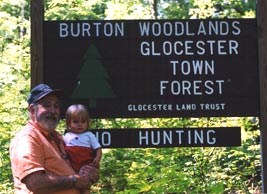Burton on the Bay 
The Fifth Generation Meets the Burton Woodlands
How you gonna keep ’em down on the farm
After they’ve seen Paree?
— Sam M. Lewis & Joe Young’s popular World War I son
How, might I ask, are you going to keep ’em down on the farm after they’ve seen not just gay Paree, but Hoboken, Peoria or Chepachet? It’s not what a farm boy sees in those communities. The quandary is, there aren’t that many farms to go back to.
Every day, there are fewer. It’s the foremost American tragedy. It’s said you can take the boy out of the farm, but not the farm out of the boy, and basically that’s true. The boy or girl who has worked the soil, tended livestock and lived the rural life — hard and fickle as it might be — eventually comes to appreciate the farm.
Methinks not enough of the non-farm community appreciate farmers. In our city/suburb-oriented society, other than at farmers’ markets or roadside produce stands, few citizens associate with farmers, appreciate their love of the land or realize the hours they work, their concerns about drought or too much rain, frosts, diseases in plants or animals and probably above all, perfidious markets, prices and expenses.
Farmers are berated when they finally give up, and their fields, pastures and woodlands are sold for development. Seldom does it occur to observers that this is usually not by choice but by necessity.
The average farmer is being squeezed out by big conglomerate counterparts; small farms are inefficient and exceptionally vulnerable to swings of the market. And, let’s face it, how long can a farmer be expected to labor hard and long for ‘wages’ that are but a fraction of what’s paid those who live in the villages and cities?
 What’s more, farmers have an image problem. They’re looked upon as greedy beneficiaries of price supports and other government handouts.
What’s more, farmers have an image problem. They’re looked upon as greedy beneficiaries of price supports and other government handouts.
Few consumers realize there are years when crops fail due to weather and other calamities. And in good production years, gluts cause prices to drop so low that what comes in doesn’t pay for fertilizer or feed for cows. Worse still, few realize the rising prices we see in markets don’t end up in the pockets of farmers. Instead those profits are ‘harvested’ by middle men who deal in commodities.
Ambassadors Need Apply
When I think of that, I understand why at this year’s Maryland State Fair in Timonium (Aug. 21-Sept. 2), no State Farm Queen will be crowned. As in many other state fairs, there will be chosen a Farm Bureau Agricultural Ambassador. Within a year or two, the choice could be a boy.
The traditional queen will be missed, but more than royalty the farm community needs ambassadors to preach the message of what farming is all about.
Today, too many think hamburgers come from Wendy’s and sweet corn from Libbys. Agriculture needs more promotion, and who’s better for the job than the budding farmers who nurture livestock, work the soil, live on farms and intend to continue to do so. Within their appreciation of farm life is a message for all: the magic of the soil, a calf growing to produce milk, a lamb to turn out wool.
Hard work goes with the turf.
Grandma’s Dream Come True
As a boy, I recall my widowed grandmother working in the field from as soon as the breakfast dishes were done to suppertime, then up late at night candling eggs while bread was baking in the wood stove — seven days a week. She was a slave to the farm, yet she loved every acre of it. It was her way of life.
So much so that in her 90s, she insisted the farm always be just that: a farm. She got her wish several years ago when the Burton family turned over more than half of it, about 112 valuable (and not just pricewise) acres, to a Glocester, Rhode Island, land trust, which promptly named it the Burton Woodlands and opened it to the public for hiking, bird watching and nature study.
Recently I attended a family reunion at the farmhouse still in family hands, and I took my newest granddaughter, Grumpy, one and a half years old, to the Burton Woodlands with its stand of striped maple, streams, glacial fens — and even resident blackthroated blue warblers, previously long thought extinct in Rhode Island.
Grumpy lives a suburban life in Crofton, but she loved her first hands-on forest experience, and I’m sure she will be back many times before and after I am gone. Grandma, who chased after a cow or two that escaped the pasture to the woodlands, would be pleased. After all, she was thinking ahead. Enough said…



 What’s more, farmers have an image problem. They’re looked upon as greedy beneficiaries of price supports and other government handouts.
What’s more, farmers have an image problem. They’re looked upon as greedy beneficiaries of price supports and other government handouts.